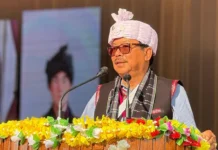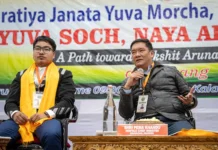RONO HILLS, 16 Feb: A two-day national seminar themed ‘Skill India: Encouraging youth towards empowerment, self-reliance and nation-building-cum-silver jubilee celebration’ began at Rajiv Gandhi University (RGU) here on Monday.
The programme, organised by the university’s commerce department, was inaugurated by RGU Vice Chancellor Prof Saket Kushwaha, who “expressed immense pleasure for organising this valuable seminar, and congratulated the commerce department for celebrating its silver jubilee,” the university informed in a release.
In the opening speeches, RGU Commerce HoD Prof RC Parida congratulated the department on its silver jubilee celebration, while Commerce & Management Dean Prof R Tamuli “highlighted the foundation remarks of the department,” the release informed.
“He expressed gratitude to all the alumni who have contributed to the department for its overall development, and highlighted the various achievements of the department since its inception in 1995,” the release said.
RGU Registrar Dr NT Rikam also congratulated the department, and encouraged the students, scholars and the presenter to “participate in the seminar actively to gain full insight on skill development,” the release stated, adding that “he also emphasised the significant value of skill in today’s job market and livelihood, besides highlighting how the students can develop their skill in different sectors for their overall development.”
RGU Finance Officer Prof Otem Padung, who is an RGU alumnus, highlighted “the importance of practical skill, along with theoretical knowledge, in today’s era,” the release said.
Arunachal Pradesh State Cooperative Union chairman Nabam Tahi Nekil in his address motivated the students to face and overcome challenges.
Retired commerce assistant professor from Assam-based Dibrugarh University, Pranjal Bezboruah, highlighted “the various significant dimensions of skill development for young professionals, and highlighted the necessity of vocational training and practical training to make the young minds more recreational and vocational,” he said.
“Like developed countries, curriculum should include practical-based courses, where proper training shall be given to the students to make them more employable, which may increase their innovation and recreation,” he advised.





